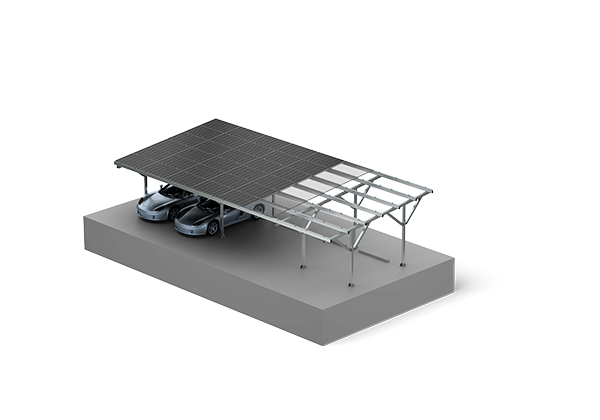Financing Your Solar Carport: Options and Incentives
August 10, 2025
As the demand for renewable energy solutions grows, many businesses and homeowners are considering carport solar installation as a viable option. Solar carports not only provide shade for vehicles but also serve as a functional way to generate clean energy. However, financing these installations can be a significant concern. In this article, we will explore various financing options and incentives available for those looking to invest in carport solar installations.

Before delving into financing options, it is essential to understand the costs associated with carport solar installation. The total cost can vary based on factors such as the size of the installation, the type of solar panels used, and any additional features like electric vehicle charging capabilities. Typically, carport solar installations may involve site assessments, design, permitting, and installation expenses.
By estimating the overall costs upfront, potential investors can better determine how much financing they will need and what options may best suit their financial situation.
Several financing options are available to support carport solar installations. One popular choice is solar loans, which allow homeowners and businesses to borrow money specifically for solar projects. These loans often come with favorable terms, including low-interest rates and flexible repayment plans, making it easier for individuals to manage their finances while investing in renewable energy.
Another option is leasing, where customers can rent solar panel systems without an upfront investment. With this arrangement, a third-party provider owns the system and takes care of installation, maintenance, and monitoring. This approach can significantly reduce the initial financial burden while still providing the benefits of a carport solar installation.
Additionally, power purchase agreements (PPAs) are another option where customers agree to buy electricity generated by the solar carport at a predetermined rate. This method allows for predictable energy costs while avoiding the high capital costs of purchasing and installing solar systems outright.
In addition to financing options, various incentives and rebates can help offset the costs of carport solar installation. Federal and state governments often offer tax credits, grants, and rebates for renewable energy investments. For instance, the Federal Investment Tax Credit (ITC) allows homeowners and businesses to deduct a significant percentage of their solar installation costs from their federal taxes.
Local governments and utility companies may also provide additional incentives, such as performance-based incentives or renewable energy certificates (RECs), which can further minimize the financial burden associated with solar carport installations.
By researching and applying for these incentives, individuals can maximize their investment in solar energy and enjoy long-term savings on energy costs.
Financing a solar carport installation involves understanding both the costs associated with the project and the variety of options available to make it financially feasible. By exploring loans, leases, and other financing methods, alongside incentives and rebates, businesses and homeowners can successfully invest in a solar carport that meets their energy needs and contributes to sustainability efforts.
At Antaisolar, we provide innovative carport solutions, including our Y Shape design, which is easy for parking and features convenient installation with sufficient space for parking. Our commitment is to ensure that customers achieve their renewable energy goals while enjoying practical and efficient designs.

Understanding the Cost of Carport Solar Installation
Before delving into financing options, it is essential to understand the costs associated with carport solar installation. The total cost can vary based on factors such as the size of the installation, the type of solar panels used, and any additional features like electric vehicle charging capabilities. Typically, carport solar installations may involve site assessments, design, permitting, and installation expenses.
By estimating the overall costs upfront, potential investors can better determine how much financing they will need and what options may best suit their financial situation.
Financing Options for Solar Carport Installations
Several financing options are available to support carport solar installations. One popular choice is solar loans, which allow homeowners and businesses to borrow money specifically for solar projects. These loans often come with favorable terms, including low-interest rates and flexible repayment plans, making it easier for individuals to manage their finances while investing in renewable energy.
Another option is leasing, where customers can rent solar panel systems without an upfront investment. With this arrangement, a third-party provider owns the system and takes care of installation, maintenance, and monitoring. This approach can significantly reduce the initial financial burden while still providing the benefits of a carport solar installation.
Additionally, power purchase agreements (PPAs) are another option where customers agree to buy electricity generated by the solar carport at a predetermined rate. This method allows for predictable energy costs while avoiding the high capital costs of purchasing and installing solar systems outright.
Incentives and Rebates
In addition to financing options, various incentives and rebates can help offset the costs of carport solar installation. Federal and state governments often offer tax credits, grants, and rebates for renewable energy investments. For instance, the Federal Investment Tax Credit (ITC) allows homeowners and businesses to deduct a significant percentage of their solar installation costs from their federal taxes.
Local governments and utility companies may also provide additional incentives, such as performance-based incentives or renewable energy certificates (RECs), which can further minimize the financial burden associated with solar carport installations.
By researching and applying for these incentives, individuals can maximize their investment in solar energy and enjoy long-term savings on energy costs.
Conclusion
Financing a solar carport installation involves understanding both the costs associated with the project and the variety of options available to make it financially feasible. By exploring loans, leases, and other financing methods, alongside incentives and rebates, businesses and homeowners can successfully invest in a solar carport that meets their energy needs and contributes to sustainability efforts.
At Antaisolar, we provide innovative carport solutions, including our Y Shape design, which is easy for parking and features convenient installation with sufficient space for parking. Our commitment is to ensure that customers achieve their renewable energy goals while enjoying practical and efficient designs.
end
